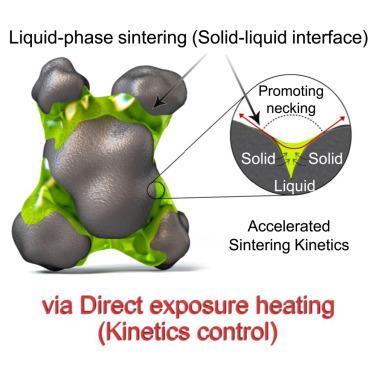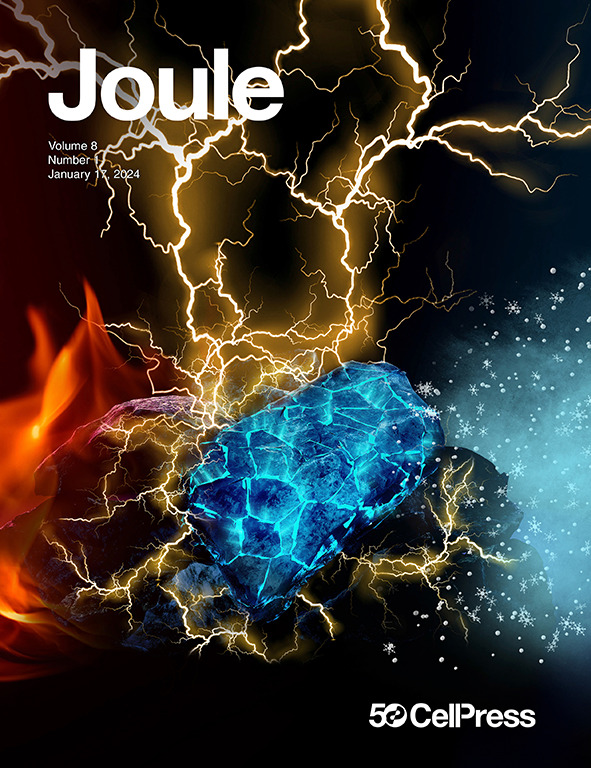锂离子电池正极升级回收中诱导液相烧结效应研究
IF 35.4
1区 材料科学
Q1 CHEMISTRY, PHYSICAL
引用次数: 0
摘要
随着人们对锂离子电池(lib)可持续性的担忧加剧,直接升级回收已成为传统回收方法的一种有希望的替代方法。然而,它的实际应用受到高压处理的需要和再生材料的有限粒度的阻碍。在这里,我们提出了一种新的升级回收方法,直接暴露加热(DEH),选择性地加速有益的反应动力学,同时抑制有害的副反应。DEH通过消除非平衡加热斜坡阶段来防止液相耗尽,并通过绕过延长的中间温度来最大限度地减少不可逆相变。在温和的压力(~ 5 MPa)下,该过程将废LiNi0.5Co0.2Mn0.3O2 (NCM523)的二次颗粒转化为结构稳定的大单晶LiNi0.6Co0.2Mn0.2O2 (NCM622)颗粒。DEH以热力学和动力学控制为基础,解决了长期存在的颗粒尺寸和结构完整性之间的权衡,提供了一种可扩展的策略,不仅可以加速LIB升级回收的商业化,还可以拓宽先进材料的合成。本文章由计算机程序翻译,如有差异,请以英文原文为准。

Study of induced liquid-phase sintering effect in lithium-ion battery cathode upcycling
As concerns over the sustainability of lithium-ion batteries (LIBs) intensify, direct upcycling has emerged as a promising alternative to conventional recycling methods. However, its practical adoption is hindered by the need for high-pressure processing and the limited particle size of regenerated materials. Here, we present a new upcycling method, direct exposure heating (DEH), which selectively accelerates beneficial reaction kinetics while suppressing detrimental side reactions. DEH prevents liquid-phase depletion by eliminating the non-equilibrium heating ramp stage and minimizes irreversible phase transitions by bypassing prolonged intermediate temperatures. Under mild pressure (∼5 MPa), this process transforms secondary particles from spent LiNi0.5Co0.2Mn0.3O2 (NCM523) into large, structurally stable single-crystal LiNi0.6Co0.2Mn0.2O2 (NCM622) particles. Grounded in thermodynamic and kinetic control, DEH resolves the long-standing trade-off between particle size and structural integrity, offering a scalable strategy not only for accelerating LIB upcycling commercialization but also for broadening advanced material synthesis.
求助全文
通过发布文献求助,成功后即可免费获取论文全文。
去求助
来源期刊

Joule
Energy-General Energy
CiteScore
53.10
自引率
2.00%
发文量
198
期刊介绍:
Joule is a sister journal to Cell that focuses on research, analysis, and ideas related to sustainable energy. It aims to address the global challenge of the need for more sustainable energy solutions. Joule is a forward-looking journal that bridges disciplines and scales of energy research. It connects researchers and analysts working on scientific, technical, economic, policy, and social challenges related to sustainable energy. The journal covers a wide range of energy research, from fundamental laboratory studies on energy conversion and storage to global-level analysis. Joule aims to highlight and amplify the implications, challenges, and opportunities of novel energy research for different groups in the field.
 求助内容:
求助内容: 应助结果提醒方式:
应助结果提醒方式:


